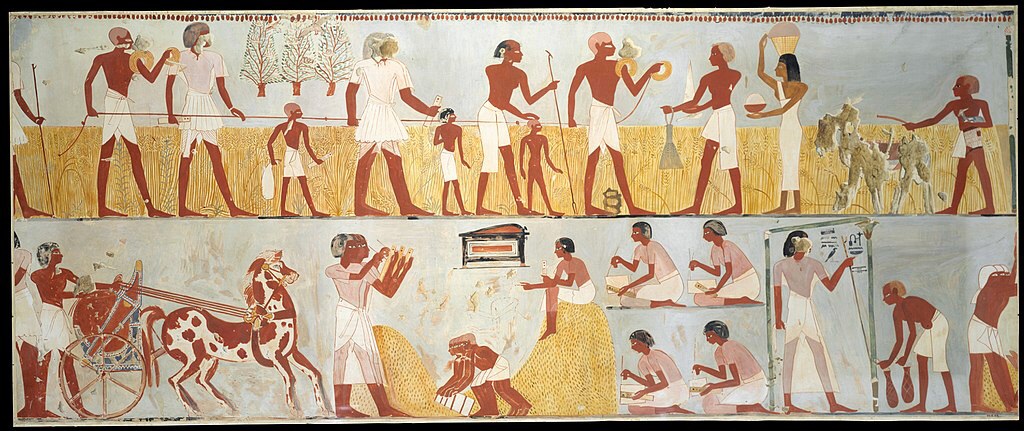
Tomb of Menna, Wikipedia commons.
Two concepts that, in their anti-commerce forms, get in the way of understanding social dynamics are commodification and alienation.
Regarding commodification (turning things into objects of exchange) we have been exchanging goods outside our immediate groups for perhaps as long as we have been Homo sapiens. Given that the only ways to get hold of something that you do not already have are to make it, take it or trade for it and that (1) we have not been generally able to individually make everything we need since we adopted a cooperative subsistence strategy (something which helped make us human) and (2) we probably want to discourage too much of the take option, that leaves trade. It is not remotely a coincidence that our material prosperity, capacity to engage in social life, personal freedom and autonomy, have all expanded as our trading has.
There are certainly questions about what should or should not be traded, and in what circumstances. But everything useful has boundaries, albeit often fuzzy ones, beyond which it stops being beneficial. That comes from living in a universe where constraints are built into the structure of reality. Constraints that we navigate by engaging in various trade-offs.
As for alienation, given that we have been trading for possibly our entire history as a species, it can reasonably be said to be incorporated within our evolved capacities, rather than being some psychic maiming. More specifically, the notion that there is something specifically bad about profit because it represents the extraction of surplus, of income that the providers of labour are otherwise entitled to, is a ludicrously simpleminded notion of profit.
We direct our labour towards what we value, but there is always the risk of consuming (or otherwise using) more value than we produce. As commercial activity thus runs the risk of loss, covering said risk of loss is a commercially necessary function that folk generally are not going to do for free.
Mistaking that labour is directed towards what we value for labour being the determinant of value obscures the central role of risk in structuring commercial activity. Those covering the risk have the greatest incentive to organise production so as to maximise the creation of value (and so minimise the risk of loss). This is why ownership of commercial enterprises by those covering the risk of loss has evolved in every commercially active society. Indeed, what exchanges are, or are not, going to be covered in that way by a particular firm is a question that helps set the boundaries of firms.
Surplus through limiting subsistence
It is also a mistake to regard such normal commercial activity as the prime method of generating surplus (i.e., production in excess of subsistence) in human societies. Ever since their inception, states have overwhelmingly dominated the actual extraction of surplus, and still do. In every developed society, the tax share of GDP is far larger than the profit share.
It is a myth that farming, the shift from taking food from the environment to making it by growing plants or raising animals, generates significant surplus on its own. What farming generates is a greater population: i.e., more babies. Hence farming’s ability to overwhelm and replace foraging across arable lands as farming populations swamped foraging populations.
In order for farming, for food production, to generate significant surplus, said surplus has to appropriated before it goes to supporting more babies. In all state societies, the overwhelmingly dominant mechanism for extracting surplus has been taxation: that is, appropriation by the state. How can we look at the Pyramids of Giza, the Great Wall of China, Angkor Wat etc, etc, etc and not realise that states dominate the creation and extraction of surplus?
Someone deriving their income from taxes gains it by a far more pure “extraction of surplus” than does anyone in business. Unless the business uses coerced labour. But labour bondage is, in effect, private taxation: using coercion to extract the scarcity premium of labour.
Businesses can leach off the surplus-extracting capacity of the state. This is known as crony capitalism. Crony capitalism harnesses the exploitative possibilities of the state through collusion between actors within business and within the state for the benefit of both, and the detriment of the wider society. Such colluding application, into the private sector, of the exploitative possibilities of the state is another manifestation of state dominance of the extraction of surplus.
The existence of states do create incentives to privatise profits and socialise losses. But through the surplus-extracting nature of the state.
Alienation and commodification may be useful mechanisms to generate an ennobling narrative of oneself as a fighter against metaphysical evils, and to de-legitimise rival (commercial) elites. In their anti-commerce forms, they are, however, not helpful for understanding social dynamics.
References
Yoram Barzel, Economic Analysis of Property Rights, Cambridge University Press, [1989], 1997.
Jared Diamond, Peter Bellwood, ‘Farmers and Their Languages: The First Expansions’, Science, 25 April 2003, Vol. 300, Issue 5619, pp. 597–603.
N. Blegen, ‘The earliest long-distance obsidian transport: Evidence from the ∼200 ka Middle Stone Age Sibilo School Road Site, Baringo, Kenya’, Journal of Human Evolution, 103 (2017) 1e19.
Amory Gethin, Clara Martínez-Toledano, Thomas Piketty, ‘Brahmin Left versus Merchant Right: Changing Political Cleavages in 21 Western Democracies, 1948–2020’, World Inequality Lab Working Paper N° 2021/15, May 2021.
Joram Mayshar, Omer Moav, & Zvika Neman, ‘Geography, Transparency, and Institutions’, American Political Science Review, 2017, 111(3), 622–636.


No comments:
Post a Comment